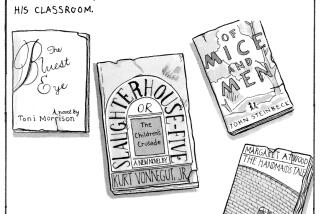In defense of ‘bad’ writers
Many years ago I met a reader who told me a story about one of my own books. My first novel “The Tattooed Soldier” was new then, having recently been published by a small house in upstate New York. I was just coming to terms, then, with the bitter truth that I’d never get rich writing books. But thanks to that one reader, I understood why I had to keep on writing. I haven’t stopped since.
I remembered that reader this week after coming upon a commentary by the founder of another small, East Coast independent publishing house. Colin Robinson of OR Books, based in New York City, wrote in the Guardian last week that too many books are being published. What’s more, the writing in them isn’t good enough and not enough people are buying them, he wrote.
“Sometimes, on darker days, it seems that my job as an editor comprises little more than hacking away at the Gormenghast-like tangle of poorly crafted words in order to admit sunlight for the few well-composed ones that are left,” Robinson wrote. “An editor friend told me she felt much of her working life had been spent ‘spinning straw into brass.’”
Therefore, Robinson argues, it would be better if everyone stopped writing altogether. “I would like to propose a writers’ moratorium. What if everyone could be persuaded to stop scribbling for a period of, say, 12 months?”
As someone who reviews books, and who therefore also receives manuscripts and self-published books in the mail and via email at a fairly steady pace, I can sympathize with Robinson’s frustration. Most of those manuscripts are, indeed, quite awful.
But why would anyone tell our best writers to stop writing? (“Will Self could pull on his hiking boots, Martin Amis sharpen his tennis serve, John Updike could have headed for the links,” Robinson wrote.) And why would anyone ask the unknown young genius who is surely out there to stop writing the book that might just transform literature (again), and thus save it (again)?
I think what Robinson really wants to say is this: Will all the bad writers stop writing and just go buy good books instead.
But even that statement would be problematic, because with few exceptions, just about everyone is awful (or not very good) starting out. And because no one can say, truly, what books need to be written and what books will find readers.
When I was in my late 20s I was a reporter at a daily newspaper and I believed I had book in me. (Robinson mocks this impulse when he quotes a survey that says 81% of Americans believe they have a book in them). I was too literal a writer to be a good novelist. So I applied to an MFA program in creative writing. Robinson suggests most of these programs are simply out to siphon money from the unworthy, but I had the good fortune to be accepted into the truly excellent program at UC Irvine.
“The Tattooed Solider” was my MFA thesis. All the big New York houses rejected it -- it didn’t look like other, successful “Latino” books to them, some said in their letters to my agent, the legendary (and now retired) Virginia “Ginger” Barber. But it finally found a home at the small Delphinium Books, in the hands of an editor (the wonderful Joy Johannessen) who helped transform the “straw” of my prose into something more enduring.
Which brings me to that one reader I met. He was part of a group of Central American community-college students in Los Angeles. They’d read “The Tattooed Soldier” because it tells a story set in Central America during the war and revolutions that swept through the region in the 1980s, sending many refugees to Los Angeles, the city where my novel begins and ends.
This young man was the son of a Salvadoran immigrant. He told me he’d read my novel and then given it to his middle-aged father to read. His father had fled El Salvador during the war but didn’t talk much about his experiences there. “My father had never read a book in English before,” the young man told me. “But he read your book. And when he was finished, he gave it back to me and said, ‘Now you know what I’ve been through.’”
The young man wept as he concluded this story. I wept too at the realization that my book had helped knocked down a wall of silence between a father and son. At that moment I understood that if no one else ever read another of my books, those two readers in one family would have justified my entire existence as a writer.
“The Tattooed Soldier” found a bigger readership in the years after it was first published (Penguin eventually picked up the paperback rights), especially as the relatively young Latino population of the West grew older and started to produce more literati hungry for books that reflected their experiences. The wider American readership and their aesthetic changed too, and as time passed they came to be more open to a novel by a Latino author with overtly political and violent themes. More than a decade later it’s still in print (a French edition will be out soon, from Belfond) and I’m proud of its small role in the history of the literature of Los Angeles.
My literary career, such as it is, exists thanks to two immutable forces. The first is my own stubbornness and determination in the face of my limitations as a writer -- and the faith that I could be “better,” and that true art was within my reach. The second is the culture of American publishing. Every writer needs a good editor. I’ve been lucky to find a few. If anything, the age of digital publishing has made the need for the editor’s craft and skill all the more apparent. Most writers, even those “with the inflated sense of self” hopelessly hacking away at their laptops, as Robinson puts it, will eventually come to realize that the only way to be read is to be edited first.
Thank God, I say, for people like Robinson and publishing houses like OR and Delphinium Books. To the people who labor in those houses, buried under a waterfall of “bad” manuscripts, I say: Don’t lose faith. The writers you find will be grateful to receive their manuscripts returned, as all of mine have been, with copious notes from patient editors. And one day you may transform their “straw” into what you think is “brass,” only to discover that there are readers who see it as the “gold” they’ve long hoped to find.
Héctor Tobar’s third book, the novel “The Barbarian Nurseries,” was published by Picador and Farrar, Straus and Giroux.
hector.tobar@latimes.com
More to Read
Sign up for our Book Club newsletter
Get the latest news, events and more from the Los Angeles Times Book Club, and help us get L.A. reading and talking.
You may occasionally receive promotional content from the Los Angeles Times.







